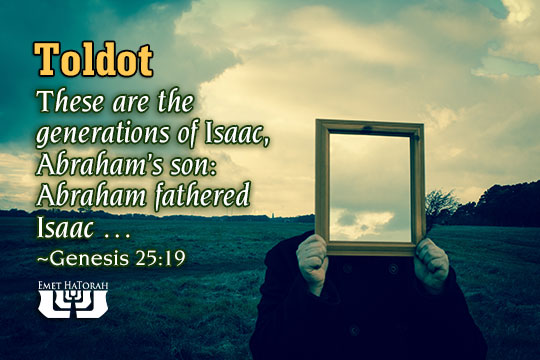Parashat Toldot - Genesis 25:19-28:9
Series:

Was Isaac really Abraham's son?
This week’s parashah begins with the words, “These are the generations of Isaac, Abraham’s son: Abraham fathered Isaac” (Genesis 25:19). Like parashat Noach, this passage uses the word “generations,” toldot (תולדת) in Hebrew, to begin the story of Isaac’s adulthood. As we had described in the story of Noah, most of the time the word toldot is used in the Torah it is in relationship to genealogy, since its primary meaning is descendants or offspring. However, like we discovered of Noah, sometimes a person’s character or unique traits are listed as their toldot, rather than listing their physical offspring. This is the case again with Isaac. Rather than beginning with the birth of Jacob and Esau, the Torah describes the toldot of Isaac as, “Abraham fathered Isaac.” Why is this?
If we look back just a few chapters previous to parashat Veyeira, we are reminded of an event that happened with Sarah in Genesis 20. When Abraham and Sarah were journeying through his land, Abimelech, king of Gerar, abducted Sarah and took her for himself. He intended on making her either a wife or a concubine. However, the Torah explains that “Abimelech had not approached her” (Genesis 20:4) when God appeared to him in a dream and revealed to him that Sarah was married to Abraham. He explained to Abimelech that “it was I who kept you from sinning against me. Therefore I did not let you touch her” (vs. 6). Mortified at the thought of taking another man’s wife and paying for it with his life, Abimelech promptly returned Sarah to her husband. After she was returned, Abraham prayed for Abimelech and his household to bear children, because “the LORD had closed all the wombs of the house of Abimelech” (vs. 18).
But the story didn’t end there. Immediately following we read about the conception and birth of Isaac. The LORD fulfilled His word to Abraham and blessed him by giving him a son through his wife, Sarah. From a scoffer’s perspective, however, it seemed that there might have been some funny business going on. Abraham and Sarah had been married for many, many years and were unable to produce any natural offspring of their own. Now, all of the sudden—after Sarah being taken by Abimelech and return to Abraham—Sarah is pregnant? Is this really Abraham’s child, or does it belong to Abimelech?
To answer this objection resolutely, Rashi says our opening verse was written in the Torah: “These are the generations of Isaac, Abraham’s son: Abraham fathered Isaac.” Based on the midrash, he interprets this passage to mean that God made Isaac to look so much like Abraham that his paternity was unquestionable. The toldot of Isaac was that he was Abraham’s son. Because he was the spitting image of his father, there was absolutely no doubt as to who might be his father. Isaac was definitely a product of Abraham.
Often people claim to be toldot of Yeshua. But being his offspring is more than a label. When people examine us, they should see an obvious reflection of our spiritual paternity. Can they see Yeshua in us? Are we a reflection of him? Or do they suspect our spiritual paternity to be of dubious origins? Just as Isaac resembled his father Abraham, disciples of Yeshua should resemble him in more ways than not. When people see us, there should be no question in their minds as to whom we belong. They should automatically say, “They are a disciple of Yeshua.”








